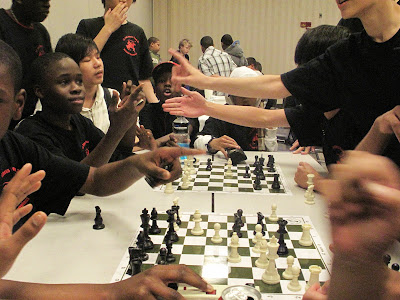Already a rising national star at age 12,
Bed-Stuy chess champ
James Black Jr. wants to become the youngest American grandmaster in the game's storied history.
Black led the chess team from Intermediate School 318 in
Williamsburg to national championships in both the K-8 and K-9 divisions in April - and is only seven points away from the 2,200 needed to be named a master by the
United States Chess Federation.
"It would mean a lot because I've worked so hard for it," said James. "I've practiced a lot to become a great player."
James wants to beat the record of
Ray Robson, a
Florida player who became the youngest American elected grandmaster at age 14 in 2009.
He needs to amass at least 2,600 points by continuing to win tournaments and score favorable results against existing grandmasters to receive that title.
Few players ever reach that level, but Black's IS 318 coach
Elizabeth Vicary said James has the ability to do it.
"I'm amazed by James," she said. "He's got enormous potential and is one of the smartest people I've ever met."
James' quest to be the best started at a young age after his dad, James Black Sr., bought a chess set at a
K-Mart to teach himself how to play.
"My dad showed me how to move the pieces around and I just liked it," he said.
James joined the chess team when he was in third grade at Public School 308 and quickly developed into a formidable player.
"He learned some things so he could start whipping on his dad," Black Sr. said.
Years of waking up early before school to play against a computer or to read chess books helped James to become an elite player, but his dad said the game also helped his son grow into a well-rounded young man.
"Over the years his chess has become something that makes him think first before he reacts," he said. "We attribute that all to chess. It's a wonderful feeling."
As one of the few young African-American players to play on the national circuit, James wants to serve as a role model for others who want to take up the game.
"It means a lot for me to be able to continue to play and win and inspire others," he said.
James' strength as a player comes from his lack of ego, Vicary said. He is willing to try whatever he can to win and doesn't become discouraged when one plan of attack doesn't work.
"He's got a fantastic memory and is very clever at forcing plays," she said.
James said he likes to "create ideas...I like to dictate what the other player has to do."
He said he models his game after
Mikhail Tal, a Russian grandmaster and world champion player who gained fame in the 1950s and '60s for his attacking technique.
"We have the same aggressive style," James said.
mpreston@nydailynews.com
original article
here










Hilariously, the article is reprinted/reposted on Susan Polgar's blog, but all references to me are edited out, and I'm cut out of the photo. :)